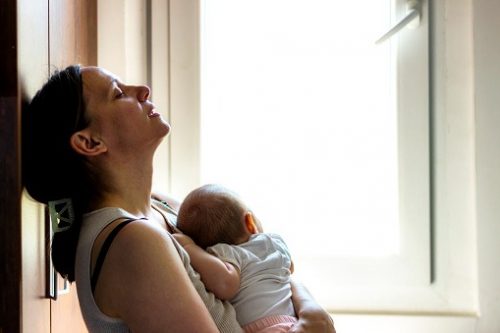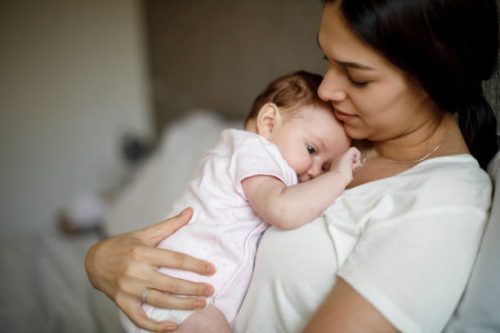Have you ever had that feeling that you wanted something so badly that you can visualize happy endings? For the longest time that I was in a married relationship, all I wanted was to get pregnant and have a wonderful baby. I always thought that when the time comes that I am going to become a mother, I would be one of those badass moms.
I often pictured myself as a friendly, outspoken, cool, and easy-to-mingle parent that my kids would totally love. So when I got pregnant and delivered a cute baby boy, I told myself that “This is it.” This is the moment that I have been dreaming of. Finally, I will become the mom I visualized myself to be.
Suddenly, It Felt Different
Unfortunately, that feeling faded away so quickly. Instead of me getting a lot of confidence, I started to lose myself and doubted my capabilities not only as a first-time mom but as a person in general. My child’s birth opened my eyes to the reality of life that having a child is not easy. From there, I began to lose all the hopes I have and eventually forgot about what I wanted to be as a mom. In some instances, I tried to give myself some boost. Perhaps this is just the beginning, and things will get back to normal again once I got over the pressure of everything. Besides, I just gave birth a couple of months ago, so I guess this is only part of exhaustion and all that.

And It Stayed That Way Longer Than I Expected And Wanted
But apparently, that feeling stayed for a longer period. And until now, I am still trying to figure out how to get better. Honestly, I already have an idea of what is happening. I am just in denial because I want to convince myself that this is nothing compared to my energetic and positive outlook in life. But guess what, I am dealing with postpartum depression (PPD), and that is a shame.
I Was In Denial
It was not easy for me to accept that I am going through PPD, as well as postpartum anxiety. I felt like I failed as a mother because I am not able to feel and appreciate the joy that I should feel as a newborn mother due to post partum depression. I was so consumed by the sadness, guilt, and anxiety that I felt like a zombie moving around. I was there but not there. I had no energy, and I felt like I was useless. I felt like I had no purpose and I was not able to take care of myself or my baby. I was so exhausted, yet I could not sleep. I was so overwhelmed by the pressure that I was feeling that I started to doubt my capabilities as a mom.
I Was So Scared And Alone
I wanted to reach out and talk to someone, but I was too embarrassed to admit that I was having postpartum depression. I thought that if I said something out loud, I would be judged and labelled as a bad mom. I was so embarrassed and ashamed of my condition that I kept it to myself.
I Searched For Answers, I Asked For Help
I was trying to find a way to get out of the darkness that I was in. I was searching for a way to feel better and be a better mom to my son. I looked for guidance, support, and understanding. I started to read books and articles about baby blues or postpartum depression and attend support groups. I was trying to get help and find people who could understand and relate to my health care condition.
Finally, I Found Help And Support
I sought out people who could understand me and provide me with the help and guidance that I needed with my depression symptoms. I talked about my struggles and found ways to cope with my postpartum depression.
I slowly started to get better and I was able to find my way out of the darkness. I developed the courage and strength to be a better mom for my son. I was also able to find the confidence to be the confident, outgoing, and caring mom that I have always wanted to be.
Seeking Help Was The Best Decision I Made
My postpartum depression journey was not easy, but I was able to get through it with the help and support of my family, friends, and medical professionals. I learned more about my condition and find the courage to be a better mom and a better person. I turned out to be the badass mom that I have always wanted to be.
It Made Me A Stronger Person And A Better Mother For My Child
I am now in a much better place and I am proud of the progress that I have made. I am proud of myself for having the courage to seek help and to be open about my condition. I am proud of myself for having the courage to be vulnerable and share my story. I no longer feel ashamed of my postpartum depression and I believe that my story can help and inspire other moms who are going through the same thing. I hope that by sharing my story, I can help other moms know that they are not alone and that there is help available.
What Are The Causes Of Postpartum Depression (PPD)?
There is often a dramatic drop in hormones in women’s bodies right after childbirth that contributes to postpartum depression. These hormones are, particularly estrogen and progesterone. The imbalance often leads the new mothers to exhaustion, sadness, hopelessness, anxiousness, and depression. In unfortunate cases, these feelings can lead to extreme measures that can influence new moms to self-harm and suicidal thoughts.
How Do You Get PPD?
PPD often promotes symptoms, including sadness and hopelessness. Usually, if a woman shows signs of crisis that bring her uncontrollable emotions, it is an obvious indicator that she is suffering and strongly affected by the history of depression. When her emotional and mental dilemma is taking a toll on her life, it is important to call a doctor immediately. PPD can occur from the first few weeks up to a year after giving birth, and often, women suffering from it are at risk of suicide.
What Is The PPD Period, And How Long Does It Last?
The postpartum period is divided into three individual stages. The first one is the initial or acute phase, which is about 6 to 12 hours after childbirth. Usually, emotional and mental issues in this phase are mild and can easily fade away. Then there is the sub-acute postpartum period. This one lasts for approximately two to six weeks. Depressive symptoms in this phase are persistent but often manageable. Lastly, there is a delayed postpartum period. It is a phase that can last up to six months or more. The severe case of delayed postpartum often leads to self-harm and suicidal thoughts as well as damaged health care.
Understanding PPD: How It Develops And Why.
Postpartum depression is a serious mental health condition that affects many new mothers. It is a type of major depression that can develop within weeks of giving birth and can last for several months. While many women experience some level of mood changes after childbirth, such as the “baby blues,” untreated postpartum depression can lead to more severe mood swings and even postpartum psychosis in rare cases. Women with a family history of mood disorders or who have experienced symptoms of postpartum depression in previous pregnancies are at an increased risk. It’s important to seek help from a mental health provider if you experience symptoms of postpartum depression. Talk therapy is often an effective treatment, and in some cases, medication may also be necessary. Don’t hesitate to seek help if you are struggling with postpartum depression or have concerns about your mental health. Don’t hesitate to seek help from a mental health provider if you are experiencing any postpartum depression symptoms or if you have any risk factors for developing postpartum depression, such as a history of mood disorders or a family history of depression. Seeking help and treatment early on can improve outcomes and prevent the condition from worsening.
How To Avoid PPD?
PPD is common in most women, regardless of their age. To prevent postpartum depression from happening, one should always consider focusing on self-care. It is essential to have a healthy lifestyle that is beneficial for overall health and recovery. Also, a new mom should need to build a strong foundation of her support system. She needs to make sure that friends and family are aware of the signs and symptoms of postpartum depression or PPD to help her heal better. It is also necessary to enlist a therapist to ask for professional recommendations regarding possible medication options.
Why Do They Say 40 Days After Birth?
Cuarentena is a period of about 40 days or six weeks. It is when the new mom refrains from having sex with her partner. She needs to dedicate herself solely to breastfeeding and taking care of the baby and herself. It is a strategy that helps new moms deal with postpartum confinement that is usually from 30 to 40 days after their delivery.
What Is Paternal PPD?
Paternal postpartum depression is a serious mental health problem that fathers may experience after giving birth, which can have a significant impact on their family members and requires the attention of a health care provider. Symptoms of paternal postpartum depression include depressed mood, mood swings, and trouble sleeping. Men who have a history of bipolar disorder or have experienced depression in the past may have a higher risk of experiencing postpartum depression after the birth of their child. An early postpartum checkup can help identify potential health problems and pregnancy complications that may lead to postpartum depression. Health professionals often use a depression screening questionnaire to assess whether new fathers are experiencing postpartum depression. Support groups can be a helpful resource for fathers who are struggling with the challenges of fatherhood and coping with the demands of a newborn. Seeking mental health help from a healthcare provider and joining support groups can provide valuable support and resources for fathers who are experiencing higher risk factors of postpartum depression or even postpartum psychosis.
How Long Does Anxiety Last After Having A Baby?
After giving birth, quite a few new moms experience stress, sadness, and anxiety rather than the joy and delight of becoming mothers. Frankly, it is normal since many people experience these so-called baby blues. These feelings are usual parts of postpartum recovery, and they usually go away after a couple of weeks following the delivery. However, if in case the anxiety tends to last, it is best to consult a medical expert for a possible diagnosis of postpartum depression.
Is It Normal To Feel Anxious After Having A Baby?
Honestly, both depression and anxiety are more common after a mom’s childbirth. The situation can also become more stressful when combined with the normal challenges of lack of sleep, unregulated eating habits, and unnecessary additional tasks. New moms also experienced feeling overwhelmed by being a new parent that they somehow think they cannot cope with. When things are out of hand and the emotional and mental state is at stake, it is best to seek professional help as quickly as possible.
How Long Until Your Hormones Are Normal After Pregnancy?
Typically, Six months postpartum is an excellent estimate for a new mom’s hormones to go back to normal. It is essential to understand that some hormone imbalance symptoms might stay for several weeks after delivering the baby. It is usually about 6 to 8 weeks. But those symptoms related to hormones while breastfeeding will stay put in the new mom’s body for as long as she breastfeeds.

Can Breastfeeding Hormones Cause Anxiety?
For some women who breastfeed, their body produces less and less prolactin, the milk-producing hormone, and oxytocin, the hormone that acts on organs in the body, including the breast and uterus. When women breastfeed, their dopamine drops excessively, and the resulting deficit causes a range of symptoms, including irritability, anxiety, and self-loathing.
What Can Breastfeeding Moms Take For Anxiety?
There are several options that new moms can take their doctor to decide that prescribed medication is the best route for them to reduce their anxiety while continuing with breastfeeding. Some of the medications to consider include SSRI antidepressants. Examples of these are sertraline, fluoxetine, paroxetine, and citalopram.
Why Do I Feel Weird About Breastfeeding?
Most women would agree that breastfeeding usually feels strange at first and even completely painful. Most new moms suffer from latching issues, nipple chafing, and making too much or not enough milk. Aside from that, breastfeeding can also be anxiety-inducing. That is because their baby gets born, but their body is not done changing yet. Thus, there is a weird feeling that sometimes gets accompanied by flu-like symptoms.
Can Breastfeeding Make You Feel Depressed?
It is often usual for new moms to feel exhausted in the postpartum phase. That is because they need to consider a lot of things, from healing from childbirth, taking care of a newborn baby, and producing breast milk. They also need to make an effort to breastfeed every 2 to 3 hours during the day and night. All these sudden tasks require a lot of emotional and mental energy.
What Are The Negative Effects Of Breastfeeding?
Breastfeeding is essential for babies. It helps and protects them against sickness, allergies, and obesity. But though it is vital for kids, it can cause some side effects for few new moms. These side effects can include back pain since, most of the time, mothers often stay in an awkward position all the time. Then there is bruising, which is common in the mother’s breasts.
Can Breastfeeding Affect Your Mental Health?
No. breastfeeding does not damage new moms’ mental health. In fact, it works the opposite way. A good breastfeeding experience can do wonderful things for women’s well-being, such as lowering their risk of anxiety and depression. It also helps them get more sleep and overcome past emotional and physical difficulties. It works well alongside reducing the risk of heart disease, reproductive cancers, and diabetes. Breastfeeding can also help mothers feel confident, empowered and heal birth trauma too.
What Does Milk Let Down Feel?
Often, new moms’ may notice different sensations in or around their breasts during milk let down. A couple of tingling sensations somehow feel like pins and needles pinching through inside and outside the breast area.

Final Thoughts
I understand that the things happening right now are out of my control. As much as I wanted to stay positive, I really can’t. But I don’t have to worry that much because I know with my family, friends, and therapist that I will get better. It might take me quite a while, but I still want to stay positive about my mental health. I want to do this not only for myself but for the child as well.
Frequently Asked Questions
What Happens When A Woman Undergoes Postpartum Depression?
Depression in any type and form, causes a range of challenging emotions, which comes with a lot of symptoms. This includes intense feelings of sadness, despair, and hopelessness. Moreover, it causes a person to lose interest in things and activities they once enjoyed. When a woman experiences postpartum depression, she losses appetite, experience sleep disturbances, and will feel fatigued. In terms of emotions, a woman will feel irritable, they will also find it difficult to concentrate, and may even think of harming themselves or their baby.
This is why it is crucial for women to have the support and professional help they need to properly and effectively address PPD.
Who Is At Risk For Postpartum?
There are lots of different factors that can increase the risk of postpartum depression. For one, some women are genetically inclined to experience it; those with a family history or personal history of anxiety and depression are likely to experience PPD after giving birth. This is because childbirth causes fluctuations in the hormones of the woman’s body (estrogen and progesterone levels), which plays a huge role in the condition.
Moreover, stressful life events, lack of social support, relationship problems, history of abuse and trauma, and financial difficulties are common contributing factors.
Subsequently, it is important to note that postpartum can affect any woman, regardless of age, cultural background, or socioeconomic status.
How Is Postpartum Treated/Cured?
Treatments for postpartum typically involves different combinations of personalized approach specifically tailored to the exact needs of the individual. Psychotherapy, specifically cognitive-behavioural therapy (CBT), is a staple in almost all types of treatment methods. This is because it is important to address the negative thought patterns of the patient first and help develop coping strategies.
For moderate and severe cases of PPD, treatment usually includes the use of antidepressant medication. Peer counselling and support groups are also almost always included in the treatment, as postpartum patients need valuable emotional support.
Lifestyle modifications, a balanced diet, regular exercise, and sufficient rest, are also advised for better overall wellbeing.
What Are The Emotional Phases Of PPD?
As with other types of depression, PPD is quite tricky, as it can manifest in various emotional phases. Initially, it manifests through overwhelming feelings of sadness. A woman can suddenly feel tearfulness and a sense of emptiness. Often, this feeling is accompanied by inadequacy as a mother and guilt. In many cases, this s followed by periods of anxiety, as the mother worries about the well-being of her baby. Many women will also feel a loss of interest and pleasure in things and activities they used to enjoy, which leads to a sense of detachment from the world.
Other symptoms include mood swings, heightened irritability, and difficulty concentrating. As the condition progresses, the woman can feel severe cases of despair and hopelessness. In worst cases, the thought of harming themselves and/or their baby will cross their mind. This is why care provider or professional intervention and emotional support are extremely important for women with PPD.
What Is The Hardest PPD Stage?
PPD can differ from one person to another. With that said, the most challenging stage is often the initial period: the recognition and acceptance of the condition. Since there always seems to be a stigma when it comes to mental health problems, acknowledging and coming to terms with it is often the hardest part.
Moreover, the overwhelming feeling of confusion, self-blame, and shame can easily confuse anyone. Not to mention the guilt of not experiencing the joy of motherhood and bonding with their baby can easily lead to a sense of failure as a mother. This is why seeking help and support is extremely crucial at this stage, as mothers need understanding and validation to commence their healing.
